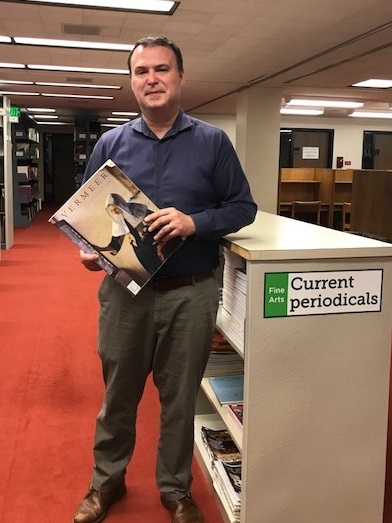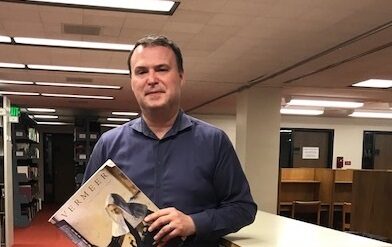The Binghamton University Libraries’ material collections are dealt with in large part by our resident expert Jim Galbraith, head of collection development. He also leads Collections, a team of faculty librarians with subject specializations, cataloguing and web-based expertise who theorize the financial and scholarly impacts of adding physical books, eBook packages and journal subscriptions prior to purchase. Additionally, Collections dictates deaccessioning projects. By viewing collections as changeable, the Libraries anticipate fluctuation and can apply formulas to issues such as budget reprioritization, technological innovation or scholarly preference to ensure the best possible long-term outcomes for faculty, staff and students.

Before coming to Binghamton, Galbraith was chief librarian of the Rakow Library of the Corning Museum of Glass, the world’s foremost library on the art, history and science of glass. Prior to that, he was associate university librarian for collections and acting university librarian at DePaul University. Galbraith has worked in collections for most of his career and has been collection development librarian at Columbia University, Wake Forest University and the University of California, Irvine. He offers insight into his position with the Libraries and the special challenges Collections faces because of COVID-19-related budget cuts.
“By definition, Collections can be the collections of resources we build to support our faculty and students’ research and instruction or the team responsible for selecting the resources and cultivating the collections,” Galbraith says. “Academic libraries build collections to support research and instruction, so we look to the curriculum, the classes that are being taught, the research interests of our faculty and campus initiatives to guide our collecting. For example, the campus recently launched new programs in pharmacy and nursing, so we purchased a lot of materials in those subjects to support those programs. More recently, we’ve been building collections in support of our Center for the Study of the 1960s and our anti-racism initiatives.”
This year, the Libraries have purchased a number of digital archives of primary resources; these timely acquisitions will support a number of departments and provide perspective on a number of current issues.
- Archives of Sexuality and Gender: International Perspectives on LGBTQ Activism and Culture
- Public Health Archives: Public Health in Modern America, 1890-1970
- Refugees and Relief: Forced Migration and World War II digital archive
- Nineteenth Century U.S. Newspapers digital archive
- Translated Texts for Historians e-library
“Another amazing opportunity for us this year is our involvement with the HathiTrust, a groundbreaking collaboration of academic and research libraries working to preserve more than 17 million digital items such as books, journals and newspapers,” Galbraith says. “It’s the largest set of digitized books managed by academic and research libraries, which is important because it is a scholarly effort, not corporate.”
In the short term, joining HathiTrust will help Binghamton provide access to our books, Galbraith adds. “Faculty and students will be able to access eBooks owned in our print collection to the fullest extent allowable by U.S. copyright law. In the long term, HathiTrust offers services such as its research center, which allows us to use the HathiTrust collection as a dataset for text and data mining. This will support our growing efforts in the digital humanities.”
According to Galbraith, the COVID-19 budget cuts present an opportunity and a challenge. “It is always difficult to cut valuable resources but, with the impact of COVID-19, we have no choice.,” he says. “At the same time, the cuts also give us an opportunity to reassess our collection strategy. We continue to expand and leverage our digital offerings — electronic resources were already a prominent part of our collection — and we are purchasing more eBooks, accessible to faculty, students and staff working remotely.
“We are also exploring new resources like HathiTrust as a way of providing access to our book collections,” Galbraith says. “In time, I would love to add the complete digital archive of Ebony magazine to our collections. The purchase would support a number of departments and initiatives, including our Center for the Study of the 1960s and our anti-racism efforts.”






